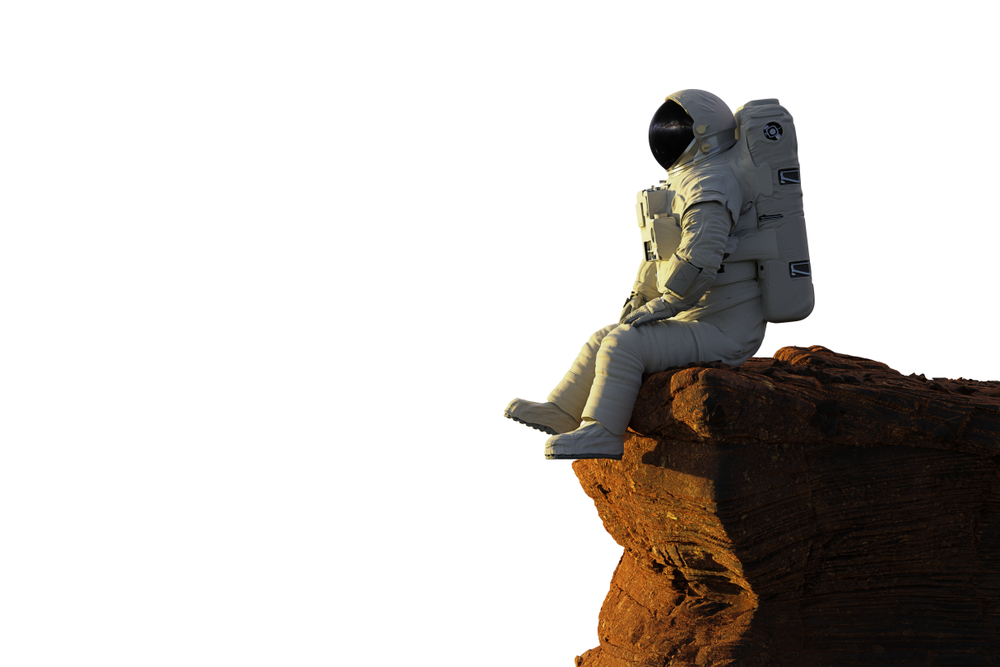If you thought the COVID-19 lockdowns were rough, think of this: Astronauts on the Mars mission will be confined to a spaceship with three to five other people for more than two years. And they will be, at peak distance, 140 million miles from anything they’ve ever known. Even the most extreme introvert and most daring adventurer might find that disconcerting. But NASA is on it.
The Human Factors and Behavioral Performance (HFBP) team, a part of NASA’s Human Research Program (HRP), works to understand and reduce the negative effects of long space missions, including finding ways to help astronauts cope with isolation. This is especially important as NASA plans longer missions, including a crewed mission to Mars. For the Mars trip, astronauts will be in space for two-and-a-half years. Contrast that with missions on the International Space Center (ISS) that, while they vary, usually last around six months.
Alexandra Whitmire helps lead HFBP’s psychological research portfolio from NASA’s Johnson Space Center. She spoke with Discover about the stresses and strains of isolation in space, how astronauts cope, and what NASA is doing to plan for even longer missions in space.
What its Like on the International Space Station
ISS astronauts are essentially in a tin can, says Whitmire, but it’s a relatively roomy tin can. Some people have compared it to a small house. Each crew member has their own quarters. Yes, these are tiny but big enough for a computer and a few books or other personal items. At the end of the day, crew members have a place away from work to relax, unwind, and recharge, she says.
ISS astronauts don’t have the luxury of going for a stroll outside, of course, but they do have exercise equipment — comparable to a treadmill, an exercise bike, and a resistance machine. Though the main purpose of the strict exercise protocol is to prevent bone and muscle loss, exercise is also good for psychological health — what Whitmire calls a “psychological countermeasure” to the negative effects of stress and isolation. Another countermeasure is food. ISS crew members have, relatively speaking, a lot of choices for food, even though some of it is dehydrated, and coffee comes in a bag with a straw rather than a mug.
Another perk on the space station is that from time to time, crew members get care packages from home, maybe a favorite food or other small gift. And even though they are a long way (420 kilometers) from home, they are in low Earth orbit, so they can FaceTime with loved ones fairly directly, says Whitmire.
All this, plus an always-available psychological support team on the ground, can help reduce the isolation and stress of life on the space station.
Read More: 15 of the Most Life-Changing Spacecraft and Missions That Fueled Our Curiosity
Next Level Isolation
But the Mars mission is an entirely different ball game. Future missions, explains Whitmire, especially missions to Mars, will have extensive communications delays, so chatting with loved ones won’t be in real-time. In addition, care packages will be drastically reduced if they are in place at all, she says. And there won’t be room for a lot of variety in food or as much exercise equipment. So many of the stresses and strains of life in isolation will be amplified.
This is why learning from ISS alone won’t give the full picture of what the Mars mission will be like, says Whitmire. So NASA has something called ground analogs designed to simulate on Earth what a real mission would be like.
In these analogs, researchers can get an idea of what kinds of behavioral and cognitive problems humans are likely to have when isolated for long periods of time in tiny spaceships with the same few people. Then, the research team can test ways to address these issues. To do that, the HFBP team works with organizations such as the National Institutes of Health, the U.S. military, research universities, and medical schools to gather research and study options to mitigate any problems.
Astronauts might be a long way from Earth, but they aren’t totally isolated. They are part of a big team, and that team includes scientists who take care of their mental health, too.
Read More: How NASA Is Prepping Mars Astronauts to Cope With Isolation and Other Extremes
Article Sources
Our writers at Discovermagazine.com use peer-reviewed studies and high-quality sources for our articles, and our editors review for scientific accuracy and editorial standards. Review the sources used below for this article:
Avery Hurt is a freelance science journalist. In addition to writing for Discover, she writes regularly for a variety of outlets, both print and online, including National Geographic, Science News Explores, Medscape, and WebMD. She’s the author of “Bullet With Your Name on It: What You Will Probably Die From and What You Can Do About It,” Clerisy Press 2007, as well as several books for young readers. Avery got her start in journalism while attending university, writing for the school newspaper and editing the student non-fiction magazine. Though she writes about all areas of science, she is particularly interested in neuroscience, the science of consciousness, and AI–interests she developed while earning a degree in philosophy. Find her on socials @AveryHurt

